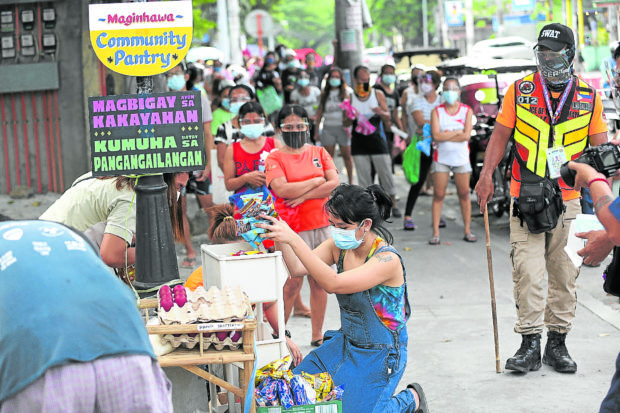Solidarity persists as community pantries continue to pop all over PH with intent to help Filipinos

People line up to get free food supplies at the Maginhawa community pantry in Teacher’s Village, Quezon City, on Saturday, April 17, 2021, after the project went viral this week as more people donate food stock on a small shelf where underprivileged people can access it but are told to only get what they need.
INQUIRER PHOTO / NIÑO JESUS ORBETA
What started as a meek, micro-level public assistance contained within a small cart in Maginhawa in Quezon City has rapidly evolved into a country-wide movement aimed at helping cash-strapped citizens bring food to their table for the time being. In a span of one week, community pantries have been organized in many parts of the country, providing aid, food, and necessities to Filipinos in need–surprisingly by Filipinos also in need.
The idea of the community pantry could be rooted to the ‘Bayanihan’ spirit which is innate to Filipino culture, wherein people help others, and those who have been aided give back to the community. Filipinos can be counted on to provide for their fellowmen in times of need, making this movement started by Anna Patricia Non a warmly-welcomed initiative by most kababayans here and around the world.
Driven by the phrase, “magbigay ayon sa kakayahan, kumuha batay sa pangangailangan” (give what you can, take what you need), Filipinos throughout the country continue to set up their own community pantries within their own localities, providing as much as they can, and receiving the same help twofold–even from people who are the least expected to help.
What is most inspiring about this movement, perhaps, are the Filipinos who still chose to help despite having nothing themselves. A taho (soya) vendor from Cavite, for example, was one of the many Filipinos in need who opened their hearts to help their fellowmen by offering the rest of his merchandise (the taho he was selling for the day) for free. There were also the fisherfolks from Binangonan, Rizal, who, despite struggling to survive in the worsening COVID-19 pandemic, banded together to donate their surplus catch to a community pantry in Quezon City.
There were also others who lined up in their own local community pantries to receive assistance and came back with their own contribution to the food aid station, capturing the hearts and sympathies of Filipinos everywhere. There were even reports of celebrities and fandoms joining in on the movement, in a bid to inspire others to help in any way possible.
Article continues after this advertisementIn some areas, food items were not the only ones being distributed to those lining up for assistance. These quirky yet essential items included coffee, pet food, face masks, face shields, hygiene products, and even prepaid load.
Article continues after this advertisementDespite a few criticisms surrounding the movement’s sustainability, Filipinos still continue to join forces to help one another amid the worsening pandemic situation in the Philippines. These community pantries are a display of solidarity unique only to Filipinos, which also drew the attention of foreign dignitaries such as the German Ambassador to the Philippines Anke Reiffenstuell, who then donated to the Maginhawa Community Pantry after being “deeply impressed” by the bayanihan spirit of Filipinos.
Private companies and brands have also started to support the movement, pitching in food items or even essential non-food items to different community pantries all over the country, such as the joint donations of call cards from Globe Telecom and Puregold, and even grocery items, to a community pantry in Tunasan, Muntinlupa City and in Hangonoy, Taguig City.
Some universities, such as De La Salle University-Manila and De La Salle-College of St. Benilde, have also organized their own community pantries, with the former owning up to its student culture by jokingly calling their station, “Dude, PANTRY, Chong!”
On their Twitter account, Canva Philippines announced that they have provided signage templates for those wanting to set up their own community pantries, as well as printing services for these signages.
Tuloy ang tulungan. Maraming salamat po sa mga nagtataguyod ng mga community pantries. Saludo po kami sa inyo!
Sa mga nangangailangan ng tulong upang makapagsimula ng kanilang #CommunityPantry, may inihanda kaming mga signages na pwede ninyong magamit: https://t.co/Zk683vDqPh pic.twitter.com/YN7SohuwiX
— Canva Philippines (@canva_ph) April 21, 2021
Bioderm and IPI have also sent their in-kind donations of hygiene products among others to a community pantry in Bacoor City, Cavite.
Though always pictured as a group of people lifting up a bahay kubo to help relocate it, the natural ‘Bayanihan’ spirit of Filipinos continues to live on even in the simplest of ways: Through helping one another persevere and beat the odds. In this case, the nation displays its resiliency against the COVID-19 pandemic and all the worries that come with it, one community pantry at a time.
INQUIRER.net/VT